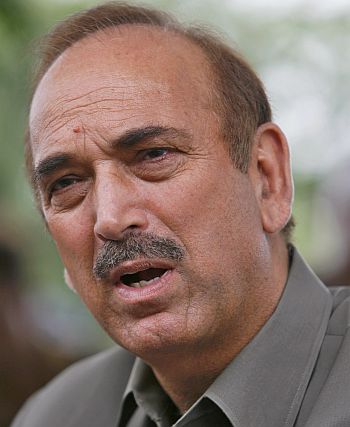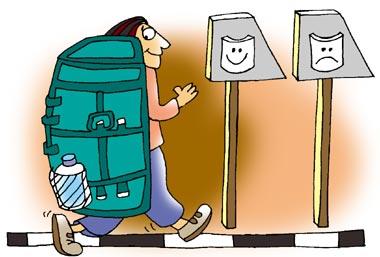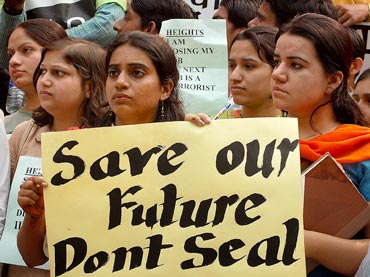
India's Health Minister Ghulam Nabi Azad would like Indian doctors travelling to the US for further studies to sign a bond assuring that they'd return to India after completing their course. Divya Nair weighs in the pros and cons.
Health Minister Ghulam Nabi Azad may have raked up a fresh controversy as he declared that those doctors wanting to pursue post-graduation in the US must sign a bond assuring the government that they would return to the country after finishing their studies there.
Azad was quoted by PTI as saying, "From this year onwards, any student going for further medical education to the US will have to give us a bond that he will come back after finishing the studies. In the last three years, 3000 doctors went abroad for studies and did not return. Now if a student does not come back from the US, he won't be allowed to practice there."
Medical education is heavily subsidised in India with almost 31,000 doctors graduating from 269 medical colleges each year according to a Press Information Bureau report.
According to Dr Tatyarao Lahane, the dean of JJ Hospital and the Grant Medical College in Mumbai it costs the government anywhere between Rs 25 to Rs 35 lakh for creating a doctor over five-and-a-half years.
The student however pays a fee of about Rs 40,000 per year, he says.
The fees vary from state to state. In government medical colleges in West Bengal, the fees are about Rs 9,000 per semester with an additional Rs 750 to 1000 per paper while at Jawaharlal Institute of Post Graduate Medical Education and Research in Pondicherry it would cost you about Rs 2,500 per year to become a doctor.
However, in the country's premiere medical institution, AIIMS, the fees according to its website are as little as a few hundred rupees -- ranging from about Rs 300 to 900 depending on whether you are an outstation student or a local.
The health minister has also said that a new US ruling demands a No Objection Certificate (NOC) from the Indian government for every student enrolling with an American institute for studies.
"No other country except the US is asking for this NOC. Those who apply to go to the US for studies from 2012 will have to give us a bond saying they would come back after finishing the studies. If they don't fulfil the bond obligation, we can write to the US to deny the student permission to practice," Azad told reporters in New Delhi.
"When your education is being so heavily subsidised, why can you not do something for the country in return?" Lahane asks rhetorically.
Whether you agree with him or not, Lahane has a point. According to a Planning Commission study released in 2012, the country is facing a shortage of 6 lakh doctors, 10 lakh nurses and 2 lakh dental surgeons.
However, attempting to impose laws to prevent young doctors from migrating is being seen by some as having a 'whiff of totalitarianism'.
"... why stop with doctors?" Global Post's Jason Overdorf asks. "What about the millions of engineers who take their heavily subsidised Indian Institute of Technology degrees off to start-ups or graduate schools in the US? And why limit the rules to leaving the country? Why not mandate that all doctors must serve a period of time at rural hospitals? Or that all engineers must work a stint at state-owned companies?"
It is, as he points out, a slippery slope.
Inputs from Abhishek Mande, Ganesh Nadar and Priyanka
Reader Invite: Dear Readers, Do you agree with the health minister's proposal asking for Indian students to return to their country after their education?
Do you think the proposal is unfair towards medical students and should also be extended to other vocations as well? Let us know what you think by posting your views on the message board below.
Please click NEXT to continue reading

Education in India has historically been the government's headache.
Unlike in the armed forces where a student graduating from the Armed Forces Medical College is obligated to work in the military through the duration of her/his (short service or permanent) commission if s/he avails of government funding and pay Rs 15 lakh if s/he chooses to break the bond, there are no rules that bind students graduating from civilian medical colleges to serve the country.
Should Azad's wish become a law, those being directly affected by it certainly won't be happy.
Ramesh Nair (name changed upon request) who studies in Mumbai's Lokmanya Tilak Municipal Medical College is one such student. He points out that students who spend as much as Rs 15 lakh for their post-graduation courses abroad are not going to find it enticing to return to India 'where the average salaries range between Rs 35,000 and Rs 40,000 per month'.
Dr Manisha Pawar, an assistant medical officer in a Mumbai hospital offers another reason. She says that medical conditions in the two nations can be very diverse and medical education in the US will 'equip you better to deal with the conditions there'.
Sumeet Pawar who is currently on a 3-month voluntary student exchange programme in the US says it is constitutionally not right for anyone to stop a student from pursuing what is best for his/her career and future.
"I think the minister is being too harsh on medical students in particular. If he really wants to bring a change, the rules must be fair for all. I am surprised why the government wants to target the medical profession; why not engineers and other vocations?"
Illustration: Dominic Xavier

Dr G Kohila from Panickanadarkudieruppu village, Tamil Nadu who is the only the third doctor the village has produced in five decades says it is the duty of the Government to provide doctors. "It is the government's duty to subsidise medical education. It is not doing anyone a favour. And forcing anyone to go anywhere in a Democracy is not right."
Meanwhile, Pawar wants to pursue his specialisation in orthopaedics and has worked at the Cleveland Clinic and University of North Carolina at Chapel Hill. He insists that Indian government medical universities should try and facilitate regular international exchange programmes to help students interact and understand how other nations are performing in this sector.
"More than 50 percent of medical seats in leading medical colleges in India are reserved. So even if I have an all-India rank of 15 in the entrance exam, I end up competing for the only 2 seats available for orthopaedics at the AIIMS in the general category. That kind of bottlenecks our opportunity and demerits our hopes to stay in the country.
India needs generalist doctors who can look after the primary health care centres. Besides, most of these doctors in India are overworked and underpaid. Those who want to do super-speciality programmes or medical research will find themselves at loss in India.
I would rather pay $ 50,000 per year and work in better conditions than struggle and complain in India"
Illustration: Uttam Ghosh

And 'subsidised' is the right word, insists Kohila.
"Since the minister is talking about the subsidised medical education offered to students, why don't you go and check out the new medical colleges that have come up recently. There are no professors, there is no equipment and yet you call it a college. Subsidising is the right word, it is also sub-standard."
Another MBBS student from Mumbai who doesn't want to be named says her two-month exchange programme in the US exposed her to a whole different side of the medical profession and explains why she favours doing her post graduation abroad.
"Students in the US have to undergo a four-year Bachelor of Science programme before applying to an MBBS programme and hence are way more focussed and better at their career compared to Indian students who pursue MBBS straight out of class 12."
Citing an incident from her 1-month rural internship experience, she says it is not always the monetary remuneration that forces students to migrate abroad.
"If you want to work or study in India, you will have to put up with lack of drugs, pathological laboratories and inadequate support staff. Indian education system is academically rigorous and does not focus on innovation or research in medical technology.
Any intelligent student who wants to pursue research will definitely choose an advanced country like US over India which offers better facilities academically and professionally."
A Kolkata-based psychiatrist who doesn't wish to be named says, "The post graduate entrance exam for medicine in India is so hard to crack. Even if you manage to, it is highly unlikely that you will get through the stream of your choice. I know friends who wanted to pursue specialisation in anaesthesia but were offered pathology instead. In such cases, students would prefer to do their PG abroad than risk taking up a specialisation they are least interested in. After all it's a matter of their career."

Currently, at the end of the five-and-a-half year MBBS course, students are obligated to complete a 12-month rural internship programme. Nair tells us that many students opt for a waiver of this internship by paying Rs 5 lakh to the government instead.
While it remains to be seen what price Azad's bond will fetch -- and like the rural internship programme it most probably will -- it may not necessarily solve the scarcity of doctors in rural areas or instill in young graduates the noble desire to serve the underprivileged.
Dr Tatyarao Lahane however likes to believe that 'as long as they are practicing in India, it is fine'.
While it is unclear what Azad's hopes to achieve with his bond plan, Dr Samrat Shah says it is a good idea but one that may be very difficult to implement.
"It is a good thing because it is only fair that if you've graduated using public money you return and serve the same population," he says, "But I have my doubts about whether this is really feasible."
Shah who has a private practice in South Mumbai and counts politicians and prominent Mumbai citizens as his patients is an alumnus of Grant Medical College that Lahane currently heads. Having completed his MD in medicine about ten years ago he tells us that more and more young doctors prefer to go overseas for their post-graduation degrees these days.
"With caste reservations taking up most of the seats in government colleges, deserving candidates are left with the option of either going to a private medical college in India or go overseas."
According to one report, there are currently 'less than 5,000 seats for an MD degree across the country' and this remains of the largest bone of contention amongst young doctors.
It is a sentiment that is also reflected amongst senior doctors in Dr Ram Manohar Lohia Hospital in New Delhi. Dr Sharad Gupta from the department of urology points out that besides getting the infrastructure up to date there is also an urgent need to increase the number of seats for the post-graduation courses.
Dr Himanshu Sharma who is a senior doctor with the hospital's cardiology unit says that it is plain unfair to expect doctors going overseas for further education to return to India.
A few other doctors who refused to be named pointed out that there is a shortage of over six lakh doctors in the country. "Stopping 3000 doctors from settling abroad is not going to make any difference," he says, "What is the minister planning to do about that?"
Mumbai-based Dr KS Sharma, member, board of governors, Medical Council of India in however said it was too early to comment on the impact of the minister's proposal.
"The media should not jump into conclusions and start discussing this matter before an ordinance is passed by the government. We will have to wait until such a rule is implemented so that we are in a better shape to say how good or bad the impact of the decision will be on medical students of the country," he said maintaining a neutral stand on the matter.
Reader Invite: Dear Readers, Do you agree with the health minister's proposal asking for Indian students to return to their country after their education?
Do you think the proposal is unfair towards medical students and should also be extended to other vocations as well? Let us know what you think by posting your views on the message board below.